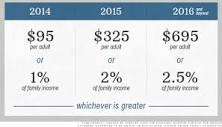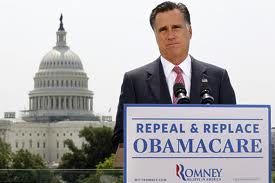
WASHINGTON — NYT
The Storm is brewing. And when it hits, everyone will feel the impact, but mostly the middle class.
Many employers had thought they could shift health costs to the government by sending their employees to a health insurance exchange with a tax-free contribution of cash to help pay premiums, but the Obama administration has squelched the idea in a new ruling. Such arrangements do not satisfy the health care law, the administration said, and employers may be subject to a tax penalty of $100 a day — or $36,500 a year — for each employee who goes into the individual marketplace.
The ruling this month, by the Internal Revenue Service, blocks any wholesale move by employers to dump employees into the exchanges.
Under a central provision of the health care law, larger employers are required to offer health coverage to full-time workers, or else the employers may be subject to penalties.
David Cordani of Cigna said the insurer planned to expand beyond the five states where it offers coverage on the exchanges.
Insurers Once on the Fence Plan to Join Health Exchanges in ’15MAY 25, 2014
Many employers — some that now offer coverage and some that do not — had concluded that it would be cheaper to provide each employee with a lump sum of money to buy insurance on an exchange, instead of providing coverage directly.
But the Obama administration raised objections, contained in an authoritative question-and-answer document released by the Internal Revenue Service, in consultation with other agencies.
The health law, known as the Affordable Care Act, builds on the current system of employer-based health insurance. The administration, like many in Congress, wants employers to continue to provide coverage to workers and their families.
“I don’t think that an employer-based system is going to be, or should be, replaced anytime soon,” President Obama said recently, when asked if the law might speed the erosion of employer-sponsored insurance.
When employers provide coverage, their contributions, averaging more than $5,000 a year per employee, are not counted as taxable income to workers. But the Internal Revenue Service said employers could not meet their obligations under the health care law by simply reimbursing employees for some or all of their premium costs.
Christopher E. Condeluci, a former tax and benefits counsel to the Senate Finance Committee, said the ruling was significant because it made clear that “an employee cannot use tax-free contributions from an employer to purchase an insurance policy sold in the individual health insurance market, inside or outside an exchange.”
If an employer wants to help employees buy insurance on their own, Mr. Condeluci said, it can give them higher pay, in the form of taxable wages. But in such cases, he said, the employer and the employee would owe payroll taxes on those wages, and the change could be viewed by workers as reducing a valuable benefit.
Andrew R. Biebl, a tax partner at CliftonLarsonAllen, a large accounting firm based in Minneapolis, said the ruling could disrupt arrangements used in many industries.
“For decades,” Mr. Biebl said, “employers have been assisting employees by reimbursing them for health insurance premiums and out-of-pocket costs. The new federal ruling eliminates many of those arrangements by imposing an unusually punitive penalty.”
When an employer reimburses employees for premiums, the arrangement is known as an employer payment plan. “These employer payment plans are considered to be group health plans,” the I.R.S. said, but they do not satisfy requirements of the Affordable Care Act.
Under the law, insurers may not impose annual limits on the dollar amount of benefits for any individual, and they must provide certain preventive services, like mammograms and colon cancer screenings, without co-payments or other charges.
But the administration said employer payment plans do not meet those requirements.
Richard K. Lindquist, the president of Zane Benefits in Park City, Utah, a software company that helps employers reimburse workers for health insurance costs, said, “The I.R.S. is going out of its way to keep employers in the group insurance market and to reduce the incentives for them to drop coverage.”
The ruling came as the Obama administration rushed to provide guidance to employers and insurers deciding what types of coverage to offer in 2015.
In a new regulation, the Department of Health and Human Services said it would provide financial assistance to certain insurers that experience unexpected financial losses this year. Administration officials hope the payments will stabilize premiums and prevent rate increases that could embarrass Democrats in this year’s midterm elections.
Republicans want to block the payments, which they see as a bailout for insurance companies that supported the president’s health care law.
In a separate rule, the administration prohibits states from imposing onerous restrictions on insurance counselors, who educate consumers and help them enroll in health plans. Under the rule, states cannot establish standards that impair the counselors’ ability to help consumers or to perform other tasks required by federal law.
In January, a federal district judge in Missouri found that the state was illegally obstructing the activities of insurance counselors, including those known as navigators. The state has appealed the decision.
A version of this article appears in print on May 26, 2014, on page A12 of the New York edition with the headline:
Tags: ACA, Affordable Healthcare Act, Barack Hussein Obama, government overreach, Obamacare, UNEMPLOYMENT











